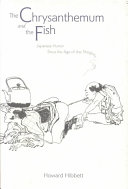

Most ebook files are in PDF format, so you can easily read them using various software such as Foxit Reader or directly on the Google Chrome browser.
Some ebook files are released by publishers in other formats such as .awz, .mobi, .epub, .fb2, etc. You may need to install specific software to read these formats on mobile/PC, such as Calibre.
Please read the tutorial at this link: https://ebookbell.com/faq
We offer FREE conversion to the popular formats you request; however, this may take some time. Therefore, right after payment, please email us, and we will try to provide the service as quickly as possible.
For some exceptional file formats or broken links (if any), please refrain from opening any disputes. Instead, email us first, and we will try to assist within a maximum of 6 hours.
EbookBell Team

0.0
0 reviewsIn
this eloquent and often deliciously amusing book, Howard Hibbett sets
out to prove that, in its own way, Japanese humor is just as robust and
varied as other people's. Jokes themselves are notoriously resistant to
translation, but in the hands of a subtle interpreter such as Hibbett,
funny stories and even puns clear the language barrier in great style.
If anything, as E. B. White said of his own works in translation, they
may at times "lose something in the original."
Hibbett's study
begins in the mists of legend, when the Sun Goddess, sulking in a cave,
is supposed to have been lured out by the laughter of lesser gods,
assembled to watch a "striptease" performed by another goddess. Echoes
of that bawdy laughter, we learn, can still be heard through the ensuing
centuries, under the accumulation of more sophisticated wit. This, he
shows us, is true not only of the age of frivolity that flowered in the
seventeenth and eighteenth centuries in the pleasure quarters of the
great cities, but of later periods when a stricter public moral code was
imposed from above and laughter was thought unseemly, with people
resorting to the private consolation of dirty or irreverent jokes. For a
while, in the first half of the twentieth century, it appeared that the
Japanese were in danger of losing their sense of humor altogether,
especially in literature. But not even war and Westernized intellectuals
could entirely suppress the sense of fun that reemerged! , alive and
well, in postwar vaudeville and films and comic books. And there
Hibbett's narrative ends, as it began -- with a comic strip. Any number
of solemn books have been written about "the Japanese character," which
ultimately is the subject of his book as well. But